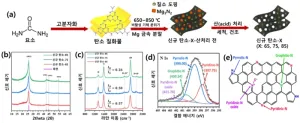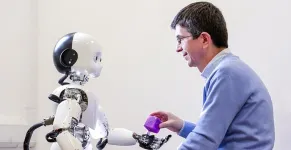(Press-News.org) □ The research team led by Professor Minseok Kim from the Department of New Biology at DGIST (President Yang Kuk) has developed a technology that can treat Charcot-Marie-Tooth (CMT) disease, an incurable hereditary disease, with electric stimulation instead of drug therapy. The core of this technology is electric stimulation that restores the abnormal distribution of peripheral myelin protein 22 (PMP 22)[1], the cause of the disease, to normal. The research team discovered it by conducting a series of electric stimulation experiments using a CMT disease subtype 1A (CMT1A) cell model. This technology has considerable potential for the development of an electronic medicine with minimal side effects in the future.
□ CMT disease causes muscle atrophy, numbness, foot deformities, paralysis, and other symptoms due to the loss of myelin sheath in peripheral nerves. It is a genetic disease that affects a large number of people, with approximately 1 in 2,500 individuals affected. However, there is currently no definitive treatment for this disease.
□ CMT1A, a subtype of CMT disease, is among the most prevalent types of peripheral nerve damage worldwide and is caused by PMP22 overexpression in Schwann cells. PMP22 overexpression in Schwann cells causes the PMP22 protein to aggregate in the cells, ultimately leading to peripheral nerve damage.
□ To address PMP22 overexpression, Professor Minseok Kim’s team developed a CMT1A cell model ‘PMP22-overexpressing schwannoma[2] cell’. This team applied a high-speed electric stimulation screening platform to the cells to identify optimal stimulation conditions for effective therapeutic outcomes. This electric stimulation eliminated the PMP22 protein aggregation around the nucleus that occurs in CMT1A disease and restored the normal distribution of the PMP22 protein towards the cell membrane, similar to that of a normal Schwann cell.
□ In addition, the research team observed an increase in the expression of genes (e.g., MBP, MAG) that play an important role in the formation of myelin sheaths constituting a part of peripheral nerves and changes in the gene expression of transcription factors (Krox-20, Oct-6, c-Jun, and Sox10) that control myelin sheath formation, leading to the induction of myelination in the CMT1A cell model.
□ Professor Minseok Kim from the Department of New Biology at DGIST stated that, “The key of this study is that it is the first demonstration that electric stimulation can restore the normal distribution of PMP22, which is a major protein in CMT1A disease.” He further expressed that, “We hope that new electric medicine technologies will soon be commercialized to address CMT disease that currently has no cure and causes suffering to millions of people worldwide.”
□ This study by Professor Minseok Kim’s research team was conducted with the support of the National Research Foundation of Korea and the results will be published in March in the prestigious bioscience journal Biosensors and Bioelectronics.
Correspondence Author E-mail : kms@dgist.ac.kr
[1] Peripheral myelin protein 22 (PMP22): growth arrest-specific protein 3 is a protein that is encoded by the PMP22 gene in humans. PMP22 is a 22 kDa transmembrane glycoprotein composed of 160 amino acids and is primarily expressed in Schwann cells in the peripheral nervous system.
[2] Schwannoma: A tumor that develops in the nerve sheath, a tubular structure that surrounds and supports nerves.
END
DGIST Professor Minseok Kim’s team develops an electronic medicine technology that restores abnormal protein behavior, the cause of Charcot-Marie-Tooth Disease (CMT)
2023-03-31
ELSE PRESS RELEASES FROM THIS DATE:
Can we connect to a virtual world as in the movie “The Matrix”? Microrobot technology has been developed for externally connecting in vivo neural networks.
2023-03-31
□ The research team led by Professor Hongsoo Choi from DGIST (President Kuk Yang) in the Department of Robotics and Mechatronics Engineering has developed a microrobot capable of forming neural networks and sectioning hippocampal tissues in an in vitro environment in an ex vivo[1] state. Through the joint research with the team led by Dr. Jongcheol Rah from Korea Brain Research Institute, the possibility of analyzing structurally and functionally connected neural networks using a microrobot in an in-vitro environment during cell delivery and transplantation has been confirmed. The research findings are ...
DGIST student startups received the Grand Prize and Excellence Award in the “LAB Start-up 2023” battle
2023-03-31
□ DGIST (President Kuk Yang) announced on March 7, 2023, that student startups, CURE and TIA, received the Grand Prize and Excellence Award, respectively, in the “LAB Start-up 2023” which is sponsored by the Ministry of Science and ICT and supervised by Commercialization Promotion Agency for R&D Outcome (COMPA) and Korea Entrepreneurship Foundation.
□ This event, which was held under the theme of "Scientific Technology, the Advocate of Entrepreneurship," involved IR and exhibitions of 146 teams that have been challenged to start a business through the ...
Professor Jong-Sung Yu’s team at DGIST develops a method for carbon support synthesis with higher stability and durability of fuel cell catalysts
2023-03-31
□ The research team led by Professor Jong-Sung Yu of the Department of Energy Science and Engineering at DGIST (President Kook Yang) has developed a low-temperature method to synthesize a highly graphitized[1] carbon support[2] that will greatly improve the lifespan of hydrogen fuel-cells[3]. They expect that the results of this study will greatly increase the possibility of commercialization by being used in fuel cells for vehicles, batteries for water electrolysis, and drones.
□ The importance of hydrogen fuel-cells is increasing with the burgeoning need for eco-friendly energy. Therefore, studies to improve the performance and lifespan of hydrogen fuel-cells ...
New trials aim to improve quality of life for autistic people as University of Warwick embraces neurodiversity this autism awareness month
2023-03-31
The University of Warwick is proud to stand with neurodiverse communities during Autism Awareness Month. This month, the University aims to raise autism awareness and acceptance, while celebrating the diversity of all individuals that make up the University of Warwick community. According to the National Autistic Society, there are around 700,000 autistic people in the UK.
As part of ongoing research into the best way to support neurodiverse individuals, academics at the Centre for Educational Development, Appraisal and Research (CEDAR) are launching two clinical trials and are encouraging autistic adults to consider ...
Smart robots to work with children to greatly improve human-machine communication
2023-03-31
A team of experts at The University of Manchester has been awarded major funding to help design smarter robots that will have more meaningfully dialogue with humans after developing improved insight into our inner feelings through language.
The European Research Council (ERC) has awarded Professor Angelo Cangelosi, co-director of the Manchester Centre for Robotics and AI, a total of €2.5million as part of the eTALK project.
The Manchester research team will combine expertise in AI ...
Latinx students reported higher depression and anxiety symptoms than other students during the pandemic
2023-03-31
Latinx children in the US experienced higher rates of depression and anxiety during the Covid-19 pandemic, a new study shows, as experts state the “pressing need” to examine the long-term impact.
Findings, published today in the peer-reviewed Journal of Clinical Child & Adolescent Psychology, follow the examination of early adolescent school data from the first two years of the pandemic, compared to pre-pandemic levels.
The results show Latinx students were 1.5 to 2 times more likely to present with risk for both depression and anxiety during every academic year cohort assessed.
The highest maladjustment was found among Latinx girls and gender non-conforming/binary ...
UC study: Engaging in civic leadership empowers refugees, immigrants
2023-03-31
Research led by a University of Cincinnati doctoral student shows that immigrants and refugees who participated in a civic leadership program felt more empowered after learning about their rights, civic entitlements and the social, cultural, and political context of Cincinnati.
“The most salient change participants reported in connection to their involvement in the program were changes in consciousness related to power, rights and opportunities which immigrants and refugees are entitled to,” says ...
Alcohol increases risk for gun-involved suicide among Americans
2023-03-30
TORONTO, March 30, 2023 – A CAMH-led study just published in the journal JAMA Network Open has found that the probability of using a gun as a means of suicide among Americans increases the more alcohol they drink.
The study looked at all suicides in a national surveillance system in the United States over a 17-year period for people 18 and older who had alcohol in their system at the time of death. It found that the more alcohol they drank, the greater the probability that they would use a gun as the means of suicide, highlighting the need ...
White-tailed deer blood kills bacteria that causes Lyme disease
2023-03-30
As tick season kicks in across the country, the executive director of the University of Massachusetts Amherst-based New England Center of Excellence in Vector-Borne Diseases (NEWVEC) and his team have completed research that offers a promising lead in the fight against Lyme disease.
The study, published recently in the journal Vector-borne and Zoonotic Diseases, demonstrates that the blood of the white-tailed deer kills the corkscrew-shaped bacterium that causes Lyme disease, a potentially debilitating illness. The Centers for Disease Control and Prevention (CDC) estimates that each year some 476,000 people are diagnosed with and treated for Lyme, the ...
Kessler Foundation scientists receive $500,000 in grants to address early intervention after spinal cord injury
2023-03-30
East Hanover, NJ – March 30, 2023 –Three Kessler Foundation scientists have received grants totaling $500,000 from the New Jersey Commission on Spinal Cord Research to advance exploratory pilot studies in early intervention after spinal cord injury. Two studies will focus on areas of rehabilitation using spinal cord transcutaneous stimulation and another will test the impact of a BrainHQ cognitive training program in improving processing speed abilities shortly after SCI.
Fan Zhang, PhD, research scientist in the ...








